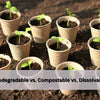Greener Kitchens, Healthier Planet: How to Create a Sustainable Kitchen at Home
- by Brodie Cook
Are you looking for ways to make your kitchen more eco-friendly? Creating a sustainable kitchen is easier than you might think. By making a few simple changes, you can help save the planet and even save some money in the process.
In this article, we'll share practical tips and tricks for transforming your kitchen into an environmentally friendly space. From choosing the right products to reducing waste, we've got you covered. Let's discover how you can create a greener kitchen and contribute to a healthier planet.
Invest in Kind Kitchen Products

One of the best ways to create a sustainable kitchen is by choosing eco-friendly cleaning products. These products are made with natural ingredients that are kinder for the environment compared to chemical ones. They also come in recycled or recyclable packaging, which helps reduce waste that ends up in landfills.
If you're looking for an easy and effective way to make your dishwashing routine more sustainable, why not use dishwashing detergent sheets from Lucent Globe? These innovative sheets are formulated with a Plant-Based Formula, Biodegradable, Hypoallergenic, Up to 80 washes/pack, and pre-measured, making them a convenient choice for your kitchen.
Another way to make your kitchen more sustainable is by investing in high-quality cookware made from materials that last longer. Look for pots and pans with non-stick coatings that are free from harmful chemicals. These will not only last longer but also use less energy when cooking. Choosing energy-efficient appliances, like dishwashers and refrigerators, can also help reduce your carbon footprint and save you money on your energy bills.
Finally, opt for reusable containers and cloth alternatives instead of single-use plastics and paper towels. This simple change can make a difference in reducing waste in your kitchen. By making these small changes, you can create a more sustainable kitchen that's better for the planet and your wallet.
Reduce Food Waste and Start Composting

Support Local and Sustainable Food Sources
Another great way to be sustainable in the kitchen is to buy local and seasonal produce. When you buy food that's grown nearby, it doesn't have to travel as far to get to your plate. This means less pollution from transportation, which is better for the environment. Local fruit and veg are also often fresher and tastier than those that have been shipped from far away.
You can also try growing your own herbs and vegetables at home. This is a fun and easy way to have fresh, healthy ingredients on hand whenever you need them. Plus, you can control how your food is grown, so you can avoid using harmful chemicals and pesticides. Start with easy-to-grow herbs like basil or mint, and then try your hand at vegetables like tomatoes or lettuce.
Finally, look for ways to support local, sustainable businesses in your community. Try shopping at farmers markets or local co-ops. These businesses often focus on selling locally grown, organic produce and other eco-friendly products. By supporting them, you're not only getting fresh, healthy food for your family but also helping to build a more sustainable food system in your area.
Adopt Water and Energy-Saving Practices in the Kitchen

Want to make your kitchen more sustainable? One easy way is to install low-flow faucet aerators on your taps. These simple devices can cut your water usage by up to 50%, saving thousands of litres of water each year. That means you'll be doing your part to conserve this precious resource and reduce your water bills at the same time.
Another great tip is to only run your dishwasher when it's completely full. This helps conserve both water and energy, as you'll be using your dishwasher less often. If you're in the market for a new dishwasher, look for energy-efficient models that use less water and power.
TIP: Read Dishwashing vs Hand Washing, which is more cost-efficient.
You can also explore eco-friendly alternative energy sources for your kitchen, such as solar power. By harnessing the sun's energy, you can reduce your reliance on fossil fuels and lower your carbon footprint. Additionally, try using energy-efficient cooking methods like pressure cooking or using a slow cooker. These methods use less energy than traditional ovens and stovetops, helping you save power and money while still creating delicious meals.
Engage and Educate Others About Sustainable Kitchen Practices
One of the best ways to promote sustainability in the kitchen is by leading by example. When you adopt eco-friendly practices in your own kitchen, you show others that it's possible and encourage them to do the same. Share your experiences and the benefits you've noticed, such as saving money on energy bills or reducing waste.
Encourage your family and friends to join you in creating a sustainable kitchen. Share tips and resources to help them get started, such as recommending eco-friendly products or providing recipes that use locally sourced ingredients. Remember, the more people who adopt eco-friendly kitchen practices, the greater the positive impact on the environment.
Recycle and Upcycle in the Kitchen

Recycling is an important part of creating a sustainable kitchen. Make sure to properly recycle packaging materials and food containers, such as glass jars, plastic bottles, and tin cans. Check with your local recycling centre to learn what items they accept and how to prepare them for recycling.
In addition to recycling, you can also upcycle old kitchenware and appliances to give them a new life and reduce waste. For example, you can repurpose old jars as storage containers or turn an old colander into a planter. When it's time to renovate or update your kitchen, consider using recycled and sustainable materials, such as reclaimed wood or eco-friendly countertops. By recycling and upcycling in the kitchen, you can reduce your environmental impact and create a more sustainable home.
FAQ About Sustainability in the Kitchen
How can I reduce my environmental impact in the kitchen?
You can reduce your environmental impact in the kitchen by reducing the amount of food waste, choosing sustainable materials like bamboo or ceramic, and storing leftovers properly. Additionally, you can invest in long-lasting items that don't need frequent replacement and make mindful choices when shopping for groceries.
Why is it important to invest in energy-efficient appliances for a sustainable kitchen?
Investing in energy-efficient appliances helps reduce energy consumption, lower utility bills, and significantly reduce your environmental footprint. It's a win-win for both the planet and your wallet.

 Dishwashing
Dishwashing Laundry
Laundry Bundles
Bundles Surfaces
Surfaces Toilet
Toilet Handsoap
Handsoap Multi-Purpose
Multi-Purpose Floor
Floor



